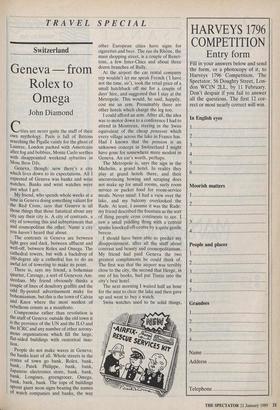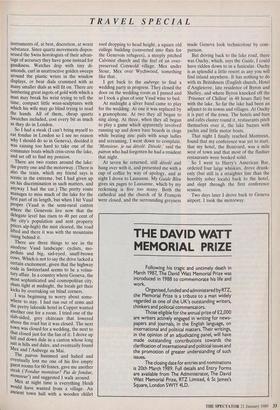TRAVEL SPECIAL
Switzerland
Geneva — from Rolex to Omega
John Diamond
Cities are never quite the stuff of their own mythology. Paris is full of Britons searching the PigaIle vainly for the ghost of Lautrec, London packed with Americans after fog and bobbies, Monte Carlo seethes With disappointed weekend sybarites in Moss Bros DJs.
Geneva, though: now there's a city Which lives down to its expectations. All I expected of Geneva was banks and wrist watches. Banks and wrist watches were Just what I got.
. My friend, who spends whole weeks at a time in Geneva doing something valiant for the Red Cross, says that Geneva is all those things that those fanatical about any City say their city is. A city of contrasts, a City of towering this and subterranean that and cosmopolitan the other. Name a city You haven't heard that about.
. The contrasts in Geneva are between light grey and dark, between affluent and well-off, between Rolex and Omega. The cathedral towers, but with a backdrop of 180-degree alp a cathedral has to do an awful lot of towering to make its point.
There is, says my friend, a bohemian quarter, Carouge, a sort of Genevois Am- sterdam. My friend obviously thinks a couple of lines of desultory graffiti and the Odd fly-posted advertisement make for bohemianism, but this is the town of Calvin and Knox where the most modest of rebellions counts as a manifesto.
Compromise rather than revolution is the stuff of Geneva: outside the old town it is the province of the UN and the ILO and the ICRC and any number of other acrony- mous organisations which fill the large, flat-sided buildings with oratorical inac- tion.
People do not make waves in Geneva; the banks least of all. Whole streets in the centre of town go bank, Rolex, bank, bank, Patek Philippe, bank, bank, Japanese electronics store, bank, bank, bank, Longines, greengrocer, Omega, bank, bank, bank. The tops of buildings Sprout giant neon signs bearing the names of watch companies and banks, the way other European cities have signs for cigarettes and beer. The rue du Rhone, the main shopping street, is a couple of Benet- tons, a few Inter-Chics and about three dozen branches of Bally.
At the airport the car rental company rep wouldn't let me speak French CI have not the time, sir'), took the retail price of a small hatchback off me for a couple of days' hire, and suggested that I stay at the Metropole. This would, he said, happily, cost me an arm. Presumably there are other hotels which charge the leg too.
I could afford an arm. After all, the idea was to motor down to a conference I had to attend in Montreux, staying in the Swiss equivalent of the cheap pensions which every village across the lake in France has. Had I known that the pension is an unknown concept in Switzerland I might have gone for somewhere more modest in Geneva. An ear's worth, perhaps.
The Metropole is, says the sign in the Michelin, a grand hotel. In reality they play at grand hotels there, and their unconvincing bowing and scraping does not make up for small rooms, surly room service or packet food for room-service meals. Never mind: I had a view over the lake, and my balcony overlooked the Rade. At least, I assume it was the Rade: my friend described the fountain as the sort of thing people cross continents to see. I saw a small piddling thing with a central spume knocked off-centre by a quite gentle breeze.
I should have been able to predict my disappointment, after all the stuff about contrast and beauty and cosmopolitanism. My friend had paid Geneva the two greatest compliments he could think of. The first was that the airport was terribly close to the city, the second that Herge, in one of his books, had put Tintin into the city's best hotel.
The next morning I waited half an hour for the mist to clear the lake and then gave up and went to buy a watch.
Swiss watches used to be solid things,
TRAVEL SPECIAL
instruments of, at best, discretion, at worst substance. Since quartz movements dispos- sessed the Swiss horologists of their advan- tage of accuracy they have gone instead for gaudiness. Watches drip with tiny di- amonds, curl in unattractive golden sweeps around the plastic wrists in the window displays, or bear dials crammed with as many smaller dials as will fit on. There are lumbering great ingots of gold with which a man may break his wrist trying to tell the time, compact little wrist-sculptures with Which his wife may go blind trying to read the hands. All of them, cheap quartz Swatches included, cost every bit as much as they do in London.
So I had a steak (I can't bring myself to eat fondue in London so I see no reason why I should do so in Geneva), decided it was raining too hard to take one of the commuter boats which criss-cross the lake, and set off to find my pension.
There are two routes around the lake: the pretty one and the motorway. (There is also the train, which my friend says is scenic in the extreme, but I had given up on his discrimination in such matters, and anyway I had the car.) The pretty route manages to miss much of the lake for the first part of its length, but when I hit Vaud Proper (Vaud is the semi-rural canton Where the Genevois live now that the delegate level has risen to 40 per cent of the city's population and sent property Prices alp-high) the mist cleared, the road lifted and there it was with the mountains rising behind it.
There are three things to see in the anodyne Vaud landscape: cyclists, mo- pedists and big, sad-eyed, snuff-brown Cows. Which is not to say the drive lacked a certain excitement, given that the highway code in Switzerland seems to be a volun- tary affair. In a country where Geneva, the most sophisticated and cosmopolitan city, shuts tight at midnight, the locals get their kicks by overtaking on blind corners. I was beginning to worry about some- where to stay. I had run out of arms and the pretty lakeside hotel in Coppet wanted another one for a room. I tried one of the slab-sided, grey chateaux that lowered above the road but it was closed. The next town was closed for a wedding, the next to that closed just for the fun of it. I drove up hill and down dale in a canton whose long suit is hills and dales, and eventually found Mex and l'Auberge au Mai. The patron hummed and hahed and eventually lent me one of his five empty guest rooms for 60 francs, gave me another steak ('Fondue monsieur? Pas de fondue, monsieur') and suggested I walk around. Mex at night time is everything Heidi would have wanted from a village. An ancient town hall with a wooden chalet roof dropping to head height, a square old college building (converted into flats for the Genevois refugees), a steeply pitched Calvinist church and the feel of an over- preserved Cotswold village. Mex under Stour, Mex over Wychwood, something like that.
I got back to the auberge to find a wedding party in progress. They closed the door on the wedding room as I passed and so I took a glass of sour Vaud wine to bed.
At midnight a silver band came to play for the wedding. At one it was replaced by a gramophone. At two they all began to sing along. At three, when they all began to play a game which apparently involved running up and down bare boards in clogs while beating zinc pails with soup ladles and screaming, I went down to complain. 'Monsieur, je sui desole. Desole,' said the patron who had forgotten he had a resident that night.
At seven he returned, still desole and hung over with it, and presented me with a cup of coffee by way of apology, and at eight I drove to Lausanne. My Guide Bleu gives six pages to Lausanne, which by my reckoning is five too many. Both the cathedral and the church of St Francois were closed, and the surrounding greyness made Geneva look technicolour by com- parison.
But driving back to the lake road, there was Ouchy, which, says the Guide, I could have ridden down to in a funicular. Ouchy is as splendid a little resort as any you will find inland anywhere. It has nothing to do with its Britishness (English church, Hotel d'Angleterre, late residence of Byron and Shelley, and where Byron knocked off the 'Prisoner of Chillon' in 48 hours flat) but with the lake. So far the lake had been an adjunct to its towns and villages. At Ouchy it is part of the town. The hotels and bars and cafés cluster round it, restaurants pitch themselves over it, the lake buzzes with yachts and little motor boats.
That night I finally reached Montreux, found that my conference was yet to start, that my hotel, the Bonivard, was a mile west of town and that most of the flashier restaurants were booked solid.
So I went to Harry's American Bar, ordered four large whiskies, drove drunk- enly (but still in a straighter line than the horribly sober locals) back to the hotel, and slept through the first conference session.
Two days later I drove back to Geneva airport. I took the motorway.



























































 Previous page
Previous page